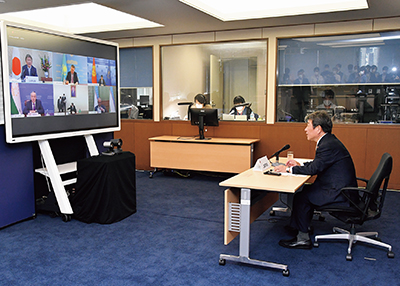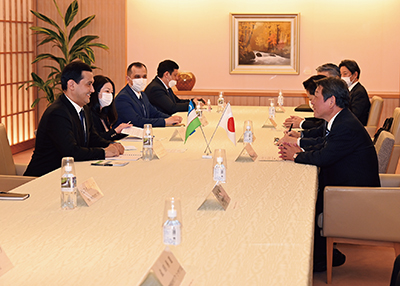Diplomatic Bluebook 2021
Chapter 2
Japan's Foreign Policy by Region
2 Countries in Central Asia and Caucasus, etc.
(1) Overview
Countries in Central Asia and Caucasus are situated in a location of geopolitical importance that connects Asia, Europe, Russia and the Middle East, and have abundant natural resources such as oil, natural gas and uranium. Stability of the region as a whole, including these countries, has significant importance in addressing key challenges that the international community faces such as fighting against terrorism and countering illicit drugs. Japan continues to work to strengthen bilateral ties with these countries through high level talks, and will be continuing initiatives to promote regional cooperation using the framework of the “Central Asia plus Japan” Dialogue.
The year 2020 saw the spread of COVID-19 in Central Asian and Caucasus countries as well. Since the end of February, the spread was initially suppressed by the implementation of strict measures, but the virus rapidly spread in several countries when they introduced mitigation measures. The pace of infections then slowed due to the re-imposition of regulatory measures, and the pandemic was under control in the region as a whole from August to September. However, the infection spread again in some countries from around October due to the relaxing of measures and the spread of the virus in neighboring countries. Japan is actively advancing cooperation, such as the grant aid of health and medical equipment, technical support through international organizations, the provision of Avigan tablets, and the exchange of opinions among medical professionals, in order to support the control of infectious diseases in countries in the region.
(2) Central Asian Countries
Japan supports the “open, stable and self-sustained” development of Central Asia, and is promoting diplomacy as a “catalyst” for the development of regional cooperation aiming to contribute to regional peace and stability. The pillars of Japan's diplomacy in Central Asia consist of (1) steadily strengthening bilateral relationships, (2) encouraging regional cooperation and contribution to the common issues of the region through the “Central Asia plus Japan” Dialogue, and (3) cooperating in the global arena.
In January, the 5th Expert Meeting (Tourism Sector) under the “Central Asia plus Japan” Dialogue was held, and opinions were exchanged between business experts from five Central Asian countries and Japan. Following that, while official travel and diplomatic events were severely restricted due to the spread of COVID-19, a Foreign Ministers' Meeting of the “Central Asia plus Japan” Dialogue was held online in August, chaired by Foreign Minister Motegi. At the meeting, the foreign ministers held active exchange of opinions on regional cooperation within Central Asia and cooperation between Central Asian countries and Japan amid the worldwide spread of COVID-19, the way forward for cooperation toward the upcoming 30th anniversary of the establishment of diplomatic relations with Japan in 2022, and the direction of the discussions toward the 8th Foreign Ministers' Meeting of the “Central Asia plus Japan” Dialogue4 to be held in Japan. Foreign Minister Motegi noted that, even under the circumstances of the COVID-19 pandemic, Japan's basic diplomatic stance that has been developed toward Central Asian countries was unwavering. Furthermore, the Minister noted on the unchanging importance of a free and open international order, to which the foreign ministers expressed their support.
 Foreign Ministers' Special Video Conference of the “Central Asia plus Japan” Dialogue (August 11, Tokyo)
Foreign Ministers' Special Video Conference of the “Central Asia plus Japan” Dialogue (August 11, Tokyo)Regarding relations with Uzbekistan, the Tax Convention between Japan and Uzbekistan entered into force in October. In December, after taking necessary measures to protect against infection, Deputy Prime-Minister and Minister of Investments and Foreign Trade of Uzbekistan Sardor Umurzakov visited Japan to meet with Deputy Prime Minister and Finance Minister Aso Taro, Foreign Minister Motegi, and Minister of Economy, Trade and Industry Kajiyama Hiroshi. Foreign Minister Motegi expressed Japan's intention to further deepen and expand the bilateral strategic partnership with Uzbekistan. In response, Deputy Prime-Minister Umurzakov appreciated assistance from Japan, including that for COVID-19 response. He stated Uzbekistan's intention to continue working on the implementation of the agreement between the two countries made on the occasion of President Shavkat Mirziyoyev's visit to Japan in December 2019.
 Meeting between Foreign Minister Motegi and Deputy Prime-Minister and Minister of Investments and Foreign Trade of Uzbekistan Umurzakov (December 15, Tokyo)
Meeting between Foreign Minister Motegi and Deputy Prime-Minister and Minister of Investments and Foreign Trade of Uzbekistan Umurzakov (December 15, Tokyo)In relations with Kazakhstan, Foreign Minister Motegi and Minister of Foreign Affairs Mukhtar Tileuberdi held telephone calls in May and October. The Ministers shared the view on further strengthening the bilateral strategic partnership and touched on cooperation for COVID-19 measures.
Regarding relations with the Kyrgyz Republic, Minister of Foreign Affairs Chingiz Aidarbekov participated in the Foreign Ministers' Meeting of the “Central Asia plus Japan” Dialogue (online) in August chaired by Foreign Minister Motegi. At the meeting, the ministers discussed how to overcome the adverse effects on the economy caused by the COVID-19 pandemic, and the importance of cooperation and sharing of knowledge for effective measures. In the Kyrgyz Republic, due to political change after the parliamentary election in October, the Cabinet and President Sooronbay Jeenbekov resigned. In the presidential election held in January 2021, Sadyr Zhaparov, who temporarily served as acting president and prime minister after the political change, was elected winning about 80% of the votes.
Regarding relations with Tajikistan, Foreign Minister Motegi and Minister of Foreign Affairs Sirojiddin Muhriddin held a telephone call in July. Foreign Minister Motegi stated that Japan continues working with Tajikistan in spheres, such as developing human resources and strengthening border control. Foreign Minister Muhriddin expressed his gratitude and expectation for further assistance from Japan. In the Tajikistan presidential election held in October, incumbent President Emomali Rahmon won in a landslide, marking his fifth consecutive win.
Regarding Turkmenistan, Prime Minister Abe held a summit telephone call with President Gurbanguly Berdimuhamedov in September. President Berdimuhamedov expressed his gratitude for the stronger-than-ever relationship built between the two countries under Prime Minister Abe, while Prime Minister Abe thanked him for his cooperation so far. In December, Turkmenistan celebrated its 25th anniversary of the Permanent Neutrality of Turkmenistan, with Japan's State Minister for Foreign Affairs Uto Takashi delivering a video message and Parliamentary Vice-Minister for Foreign Affairs Nakanishi Satoshi attending a celebration ceremony in Tokyo.
In recent years, efforts toward advancing regional cooperation have become active among Central Asian countries. In 2020, while official travel was difficult due to the COVID-19 pandemic, a variety of meetings were held online. The Supreme Eurasian Economic Council of the Eurasian Economic Union (EAEU) was held in May and December, the Shanghai Cooperation Organization (SCO) Summit was held in November, and the Collective Security Treaty Organization (CSTO) Summit and the Commonwealth of Independent States (CIS) Summit were held in December. During the political change in the Kyrgyz Republic in October, leaders of Uzbekistan, Kazakhstan, Tajikistan and Turkmenistan issued a joint statement intended to strengthen solidarity in Central Asia, calling for preserving peace and restoring stability in the Kyrgyz Republic.
In addition, foreign ministers' meetings with one country added to the five Central Asian countries were actively held mainly online. The five Central Asia countries held foreign ministers' meetings with the U.S. and the EU in June, China in July, Japan in August, Russia and India in October, and the EU and the Republic of Korea (ROK) in November.
- 4 Japan launched the “Central Asia plus Japan” Dialogue framework in 2004 from the perspective that regional cooperation for solving common regional issues is indispensable for the stability and development of Central Asia, with Japan as a “catalyst” to promote regional cooperation. In addition to the seven foreign ministers' meetings, various discussions have been held with the participation of experts and business people. More than 15 years have passed since its establishment, and in recent years it has focused on practical cooperation.
(3) Caucasus Countries
The Caucasus region has a potential to be a gateway connecting Asia, Europe and the Middle East, and geopolitical importance that directly affects the peace and stability of the international community. Japan is developing its diplomacy based on basic policy for this region, which is comprised of two pillars announced in the Caucasus Initiative in 2018: (1) assistance for human resources development of architects for state building (human resources development) and (2) assistance for paving the way to “Appealing Caucasus” (infrastructure development and business environment improvement).
On September 27, an armed confrontation between Armenia and Azerbaijan occurred over Nagorno-Karabakh. Japan expressed serious concern about the armed confrontation and the loss of lives, and urged all parties concerned to cease any military actions immediately, exercise maximum self-restraint and resume a dialogue. On November 9, the leaders of Russia, Azerbaijan and Armenia reached a ceasefire agreement, but thousands were killed until this agreement was reached. The international community is paying attention to whether this agreement will be maintained and adhered to, and whether it will lead to a peaceful solution to the Nagorno-Karabakh issue.
Regarding relations with Georgia, Foreign Minister Motegi and Minister of Foreign Affairs David Zalkaliani held a Foreign Ministers' telephone call in May. Both Ministers shared the view to promptly conclude a Japan-Georgia bilateral investment agreement and to further revitalize mutual exchanges in the fields of economy and others after convergence of COVID-19. In October, the two governments agreed in principle on the Tax Convention between Japan and Georgia.
(4) Republic of Belarus
Prior to the presidential election held on August 9, three leading candidates were unable to run for election for reasons of illegal acts or flaws in procedures. Following the election, the authorities announced that incumbent President Alexander Lukashenko received about 80% of the vote, while Sviatlana Tsikhanouskaya, who had garnered attention as a leading opposition candidate, received about 10% of the vote. In response large-scale protests broke out in various parts of Belarus and protesters clashed with security forces over calls that the election was fraudulent. The protests continued as a large-scale demonstration every weekend, with Belarusian authorities violently and arbitrarily detaining a large number of participants and restricting the activities of some media outlets and reporters.
The opposition have set up a “Coordination Council,” which demands to stop the violence and re-hold the election, but core members have been interrogated and detained by the authorities, and a part of the opposition has been forced into exile. Even after moving its base of operation to Lithuania, Ms. Tsikhanouskaya continues to appeal to the international community for the transfer of power and the legitimacy of protests by engagement through video messages and dialogue with high-level officials of the European and U.S. governments, and participating in online meetings such as the European Parliament and the UN Security Council.
Many Western countries have repudiated the presidential election results and the legitimacy of President Lukashenko, while also criticizing the violence by the authorities. The U.S., Canada, the EU, the UK and other countries have imposed sanctions against Belarus such as travel restrictions and asset freezes.
Japan has issued four foreign press secretary statements on the situation in Belarus and has strongly urged the authorities of Belarus to immediately cease the arbitrary detention and forceful oppression of citizens, engage in national dialogue that respects the principles of the rule of law and democracy, and make an earnest effort in responding to the situation.
